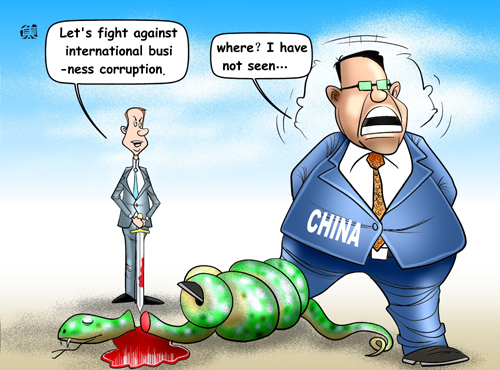China should respond to US companies' bribery
American telecommunications company UTStarcom has admitted to bribing officials of state-owned telecommunication companies in China and will pay a US$3 million fine, according to an announcement by the United States Department of Justice on December 31, 2009. UTStarcom was accused of spending vast amounts of money on trips to the United States for Chinese officials.
This is not the first case of American companies bribing Chinese officials. Lucent Technologies, Avery Dennison, the American leading manufacturer of tapes and Control Components Inc. (CCI), a provider of severe service control valve solutions, had previously been fined by the US law enforcement officials on their schemes of bribery.
 |
|
[By Jiao Haiyang/China.org.cn] |
Business bribery is the enemy of a fair marketing economy. Foreign bribery may seemingly only damage the interest of the bribed side. However, it can also damage the image of enterprises from the bribing countries. Nowadays, business competition is not only based on operational strength but also image. A country's neglect to its corporations' bribery to foreign officials or companies would harm its image as a whole and further limit the potential of its enterprises' in exploring the global market. That's why the US government is so strict regarding overseas business bribery. With more and more Chinese enterprises adopting global strategies, China should take a worldwide view on handling business corruption. It should learn from the U.S. and establish a clean image as well as severely punishing commercial bribery home and abroad to win local trust and maximize profits.
Japan may be an example to follow. In the 1970s, business corruption prevailed in Japanese market. On February 4, 1976, the US Senate announced that the aerospace company Lockheed Corporation bribed foreign officials in the process of negotiating the sale of aircraft which involved the former Japanese Prime Minister Tanaka Kakuei. Japan set up a special investigation committee for this case. Tanaka was sentenced to four years in jail and fined 500 million yen. After this scandal, the number of business corruption cases distinctly decreased in Japan and its image has improved greatly.
However, we could not eradicate business corruption without a complete legal system. China does not currently have any specific laws which forbid bribing foreign government officials as the Foreign Corrupt Practices Act does in the U.S. Moreover, there are no laws concerning domestic business corruption and bribery. What we have are only some relative items or regulations in Anti-unfair Competition Law and Criminal Law. They are not sufficient to handle bribery in the form of "training" or other unconventional schemes. Training related bribery refers to companies' offering free training, which would otherwise be very expensive, to officials.
In recent years, American companies have bribed Chinese officials many times. But most of them have been investigated and fined by the US law enforcement department. If China continues to do nothing to enhance its legislation and law enforcement on foreign business corruption and bribery, what image would the Chinese market have? We should observe that the lack of legal restraints on Chinese enterprises' overseas business operations would undermine their competence in overseas market.
(This article was translated by Li Shen.)
 0
0 







Go to Forum >>0 Comments